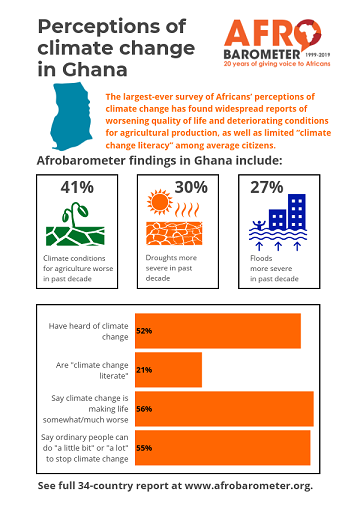Limited ‘Climate Change Literacy’ In Africa – Pan-Africa Profiles Series Survey Finds

The largest-ever survey of Africans’ perceptions of climate change has found widespread
reports of worsening quality of life and deteriorating conditions for agricultural production, as well as limited “climate change literacy” among average citizens.
In the ninth of its Pan-Africa Profiles series based on recent public-opinion surveys in 34
African countries, Afrobarometer reports that in all but four countries, pluralities say climate conditions for agricultural production have worsened over the past decade, most often due to drought.
Among Africans who have heard of climate change, a large majority including about nine out of 10 East Africans – say it is making life in their country worse.
However, fewer than three in 10 Africans are “climate change literate” in the sense that they have heard of climate change, associate it with negative changes in weather patterns, and know that human activity is a major cause.
For Ghana-specific findings, Four in 10 Ghanaians see worsening agricultural conditions, but only half of citizens are aware of climate change.
The new Pan-Africa Profile report explores widely varying experiences and perceptions of climate change by country and region, and points to a need for policymakers and activists to build informed core populations that understand climate-change threats and will support coordinated government and international action.
It its findings, it was established that by more than 2-to-1, ordinary Africans say climate conditions for agricultural production have become worse in their region over the past decade. Overwhelming majorities see worse weather for growing crops in Uganda (85%), Malawi (81%), and Lesotho (79%).
“In most countries, the main culprit is more severe drought. But in Malawi,
Madagascar, and eSwatini, most citizens say both droughts and flooding have
gotten worse. Almost six in 10 Africans (58%) have heard of climate change, including more than three-fourths of Mauritians (83%), Malawians (78%), and Ugandans (78%). South Africa (41%) is one of just five countries where fewer than half of citizens have heard of climate change,” the findings indicated.
Also, Groups that are less familiar with the concept of climate change include rural
residents, women, the poor, and the less-educated, as well as people who work in
agriculture and among Africans who have heard of climate change, about two-thirds (63%) associate the term with negative changes in weather patterns, compared to about one-third who link it with positive (17%) or other (15%) changes.
“About two-thirds blame climate change on human activity (52%) or on human
activity combined with natural processes (16%). More than one in four (27%) think
climate change is caused by natural processes alone. About one in four Africans (28%) are fully “climate change literate,” that is, they have heard of climate change, they understand it to have negative consequences, and they recognize it as being caused at least in part by human activity. Mauritians lead the way at 57% – the only country where a majority is climate change literate.”
Fewer than one in five are climate change literate in six countries (Liberia, Mozambique,
Namibia, Niger, South Africa, and Tunisia), whilst two-thirds (67%) say climate change is making life in their countries worse, reaching a high of 89% in East Africa, almost twice as many as in North Africa (46%).
Seven in 10 (71%) say climate change needs to be stopped, and about half (51%)
think ordinary people can do at least “a little bit” to help. But in Liberia (26%), Sudan
(28%), and Niger (33%), only one-third or less think ordinary people can make any
difference.

